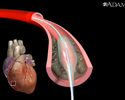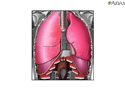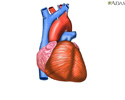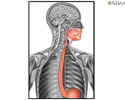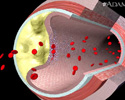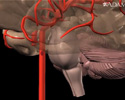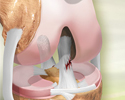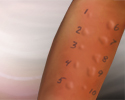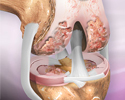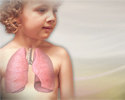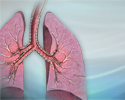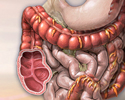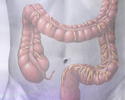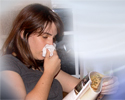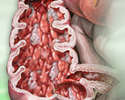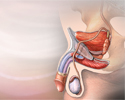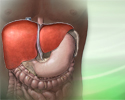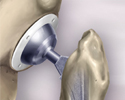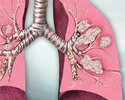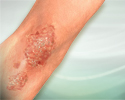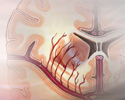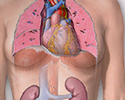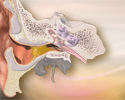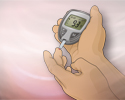Flu
Your head is throbbing. Your throat is burning. You're coughing nonstop, and your whole body aches. This is no run-of-the-mill cold. You may have the flu. Let's talk about influenza, also known as the flu. Winter is a time for sledding, snowball fights, and flu. Every winter, millions of Americans come down with this respiratory ailment and feel absolutely miserable. Like the common cold, the flu is caused by a virus. But with the flu, it's the influenza virus that makes people so sick. The flu virus comes in a few different forms. Influenza A is most common between early winter and spring. You can catch influenza B year-round. Swine flu, or H1N1, is a specific type of influenza A. You catch the flu from someone who has it. When people with the flu sneeze or cough, they send a spray of droplets filled with the flu virus into the air. If you're unlucky enough to be nearby, you could breathe in those droplets. Or, you might touch a surface that the droplets have fallen on and then touch your nose or mouth. Two to three days later, the first flu symptoms will appear. Usually you'll start running a fever. Then you'll feel achy and tired. You may have the chills and feel sick to your stomach. After a couple of days, the sore throat and cough will set in. So, how do doctors treat the flu? Because a virus causes the flu, antibiotics won't treat it, they only kill bacteria. There are antiviral medicines, but you need to start taking them within the first 2 days after your symptoms appear. Until the illness runs its course, help yourself feel better by getting a lot of rest and drinking extra fluids. You can take an over-the-counter cold medicine to relieve your congestion and cough. Tylenol, Advil, or Motrin can bring down your fever and take some of the pain out of your sore throat. Aspirin isn't recommended during the flu, especially under age 18, because it could increase the risk for a rare, but serious, condition called Reye syndrome. By itself, the flu usually isn't harmful. But it can make existing conditions like asthma and breathing problems worse. In older people or those with a weakened immune system, the flu can turn into pneumonia, bronchitis, and other more serious diseases. For most healthy people, the flu is a short-term annoyance. They're stuck in bed for a week or two, and then their symptoms go away and they're back up and around. But thousands of people each year get very sick from the flu, especially the elderly, young children, and pregnant women. Many are hospitalized, and about 36,000 people die from flu complications. To avoid getting the flu, eat well, get plenty of exercise and sleep, and practice good hygiene. Wash your hands often with warm water and soap or use an alcohol-based hand sanitizer. Don't share cups, plates, or utensils, especially during flu season. And most effective, get your flu shot every fall to protect you through the whole flu season.
Flu
Review Date: 7/8/2023
Reviewed By: Linda J. Vorvick, MD, Clinical Professor, Department of Family Medicine, UW Medicine, School of Medicine, University of Washington, Seattle, WA. Also reviewed by David C. Dugdale, MD, Medical Director, Brenda Conaway, Editorial Director, and the A.D.A.M. Editorial team.
Animations
Browse All
- Allergies
- Alzheimer disease
- Ankle ligament injury
- Arrhythmias
- Atherosclerosis
- Athetosis resulting from basal...
- Balloon angioplasty - short se...
- Bladder function - neurologica...
- Blinking
- Blood clotting
- Blood flow
- Blood pressure
- Bone fracture repair
- Brain components
- Breast lift
- Breathing
- Bunion
- Cancer of the throat or larynx...
- Cardiac conduction system
- Cardiomyopathy
- Cardiovascular system
- Cataract
- Cell division
- Cerebral aneurysm
- Cesarean section
- Components of skin
- Conception - general
- Conception - pregnancy
- Conception of identical twins...
- Concussion
- Corneal injury
- Coronary artery bypass graft (...
- Coronary artery disease
- Cosmetic surgery of the face
- Coughing
- Diabetes - retinal conditions...
- Digestion
- Directional coronary atherecto...
- Early labor
- Egg cell production
- Egg production
- Endocrine glands
- Enlarged prostate gland
- Epinephrine and exercise
- Exercise
- Feeling pain
- Fetal ear development
- Formation of twins
- Gas exchange
- Glaucoma
- Gout
- Hearing
- Hearing and the cochlea
- Heart bypass surgery
- Heart formation
- Heartbeat
- Heartburn
- Herniated nucleus pulposus (sl...
- Homeostasis
- Human face formation
- Hypertension - overview
- Immune response
- Intracytoplasmic sperm injecti...
- Kidney stones
- Kids - How big is the baby?
- Kids - How does the baby come ...
- Kids - Is it a girl or boy?
- Kids - Umbilical cord
- Kids - Where do babies come fr...
- Liposuction
- Lymph nodes
- Lymphatics and the breast
- Macular degeneration
- Muscle types
- Nerve conduction
- Nervous system formation
- Nutrient exchange
- Osteoarthritis
- Osteoporosis
- Ovulation
- Parkinson disease
- Percutaneous transluminal coro...
- Peristalsis
- Phagocytosis
- Pituitary gland
- Placenta delivery
- Placenta formation
- Preeclampsia
- Pregnancy
- Red blood cell production
- Reflex response
- Retina
- Retinal detachment
- Rupturing membranes
- Seeing
- Sexual differentiation
- Shoulder joint dislocation
- Skeletal formation
- Skeletal muscle
- Skeletal system components
- Skin conditions
- Smelling
- Smoking
- Snoring
- Sperm production
- Sperm release pathway
- Stomach ulcer
- Stomach ulcer
- Stroke
- Stroke - secondary to cardioge...
- Sun's effect on skin
- Swallowing
- Sweating
- Tachycardia
- Tasting
- The role of amniotic fluid
- Tobacco use - effects on arter...
- Twin-to-twin transfusion syndr...
- Ultrasound
- Urination
- Vaccines
- Vaginal delivery
- Vasectomy
Videos
Browse All
- Diabetes
- Abdominal aortic aneurysm
- Abdominal pain
- ACL injury
- Acne
- Adenoid removal
- Adolescent depression
- After your child's ear tube su...
- After your child's inguinal he...
- After your child's tonsil or a...
- After your child's umbilical h...
- Alcoholic liver disease
- Allergic rhinitis
- Allergies
- Allergy testing
- Allergy to mold - animal dande...
- Alzheimer disease
- Anemia
- Ankylosing spondylitis
- Anterior shoulder stretch
- Anti-reflux surgery
- Appendectomy
- Appendicitis
- Arm reach
- Arthritis
- Asperger syndrome
- Asthma
- Asthma - children
- Atopic dermatitis
- Atrial fibrillation
- Attention deficit hyperactivit...
- Autism spectrum disorders
- Basal cell carcinoma
- Before a child's tonsil or ade...
- Bipolar disorder
- Breast cancer
- Breast engorgement
- Breast self-exam
- Breastfeeding
- Bronchitis
- Bronchoscopy
- Cardiac catheterization
- Carpal tunnel syndrome
- Cataracts
- Cerebral palsy
- Cervical cancer
- Chest pain
- Childhood obesity
- Cholesterol and triglyceride t...
- Chronic obstructive pulmonary ...
- Cluster headache
- Cold treatments for kids
- Colon cancer
- Colon cancer screening
- Colorectal polyps
- Common cold
- Concussion
- Crohn disease
- C-section
- Cystic fibrosis
- Cystic fibrosis - nutritional ...
- Depression
- Dialysis
- Diarrhea
- Ear infection - acute
- Ear infection - chronic
- Ear tube insertion
- Earache
- Electrocardiogram
- Endometriosis
- Enlarged adenoids
- Enlarged prostate
- Epilepsy
- Erection problems
- Essential hypertension
- External rotation with band
- Fibromyalgia
- Flu
- Food poisoning
- Foot pain
- Gallstones
- Gastroesophageal reflux diseas...
- Gastroesophageal reflux in inf...
- Getting rid of lice in the hom...
- Glaucoma
- Hardening of arteries
- HbA1c
- Head injury
- Head lice
- Healthy Guide to Fast Food
- Hearing loss
- Heart attack
- Heart failure
- Heel pain
- Hepatitis A
- Hepatitis B
- Hepatitis C
- Hernia
- Herniated disk
- Hip joint replacement
- Hodgkin lymphoma
- How do ear tubes come out?
- How to remove a splinter
- How to stop bedwetting
- How to treat a nosebleed
- How to treat a sunburn
- How to use a peak flow meter
- How to use a pill cutter
- How to use eye drops
- How to use nasal sprays
- Hypertension
- Hyperthyroidism
- Hypothyroidism
- Hysterectomy
- Infant formulas
- Inguinal hernia repair
- Inhaler with no spacer - adult...
- Inhaler with no spacer - child...
- Inhaler with spacer - adults
- Inhaler with spacer - child
- Insomnia
- Internal rotation with band
- Iron deficiency anemia
- Irritable bowel syndrome
- Isometric
- Kidney stones
- Knee joint replacement
- Let's talk about pink eye
- Lung cancer
- Lyme disease
- Melanoma
- Menopause
- Migraine
- Multiple sclerosis
- Nasal congestion
- Neck pain
- Newborn jaundice
- NICU consultants and support s...
- Nuclear stress test
- Obstructive sleep apnea
- Osteoarthritis
- Osteoporosis
- Pap smear
- Pendulum exercise
- Peptic ulcer
- Pharyngitis
- Plantar fasciitis
- Pneumonia
- Pregnancy care
- Prepare for your child's ear t...
- Prepare for your child's herni...
- Prostate cancer
- Psoriasis
- Rheumatoid arthritis
- Rotator cuff problems
- Sciatica
- Scoliosis
- Seizures
- Shingles
- Shoulder blade retraction
- Shoulder blade retraction with...
- Shoulder pain
- Sinusitis
- Sleep disorders
- Smoking tips to quit
- Spinal stenosis
- Stent
- Storing breast milk
- Strep throat
- Stretching back of your should...
- Stroke
- Systemic lupus erythematosus
- Tension headache
- The difference between a cold ...
- Tips on buying cold and flu me...
- Tips on removing ear wax
- Tonsillectomy
- Tonsillitis
- Tracking your blood pressure a...
- Treating congestion in babies...
- Treating eyelid bumps
- Type 1 diabetes
- Type 2 diabetes
- Ulcerative colitis
- Understanding cholesterol resu...
- Up the back stretch
- Urinary incontinence
- Urinary tract infection - adul...
- Uterine fibroids
- Vacation health care
- Varicose veins
- Venous insufficiency
- Wall push-up
- Wall stretch
- Warts
- What are hives?
- What are night terrors?
- What causes wheezing?
- What in the world is a neti po...
- What is tennis elbow?
- What makes your heart beat?
- What to do when kids put thing...
- What to do when kids put thing...
- What to do when something gets...









